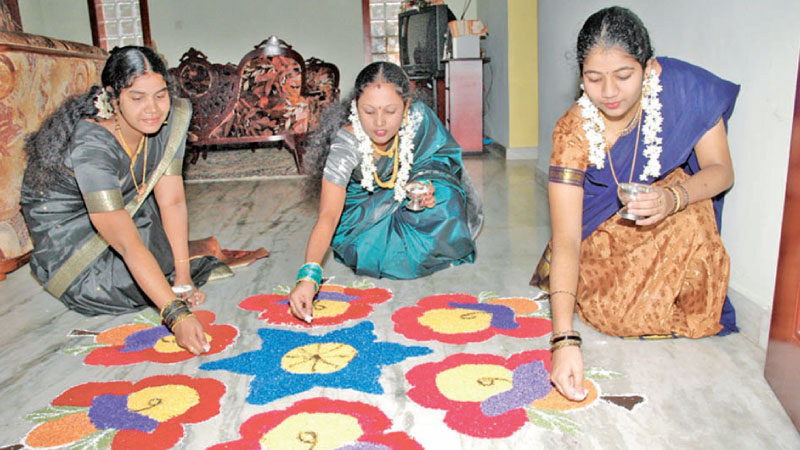Thai Pongal is one of the first Hindu festivals of the year which is celebrated by Tamils across the world. The multi-day harvest festival of South India and Sri Lanka is observed during the second week of January. This year, it falls today, January 14. It is dedicated to the Sun God (Surya). Farmers worship the Sun and celebrate the harvest for the whole year. The festival is largely celebrated in South India for four days and it includes Bhogi Pongal, Surya Pongal and Mattu Pongal. Sri Lankans generally celebrate Thai Pongal for two days with the Pongal being cooked on the first day.
‘Thai’ is referred to the 10th month in the Tamil calendar and the word ‘pongu’ is the act of boiling over of a pot of rice. Pongal is also the name of a sweetened dish of rice boiled in milk and jaggery that is ritually consumed on this day. The Pongal festival is mentioned in an inscription in the Veeraraghava temple dedicated to Vishnu in Thiruvallur, Chennai. Credited to the Chola King Kulottunga I (1070 – 1122 CE), the inscription describes a grant of land to the temple for celebrating the annual Pongal festivities. Similarly, the ninth-century Shiva bhakti text, Tiruvembavai by Manikkavachakar vividly mentions the festival.
According to Andrea Gutierrez - a scholar of Sanskrit and Tamil traditions, the history of the Pongal dish in a festive and religious context can be traced to at least the Chola period. It appears in numerous texts and inscriptions with variant spellings. In early records, it appears as ponakam, tiruponakam, ponkal and similar terms. Some of the major Hindu temple inscriptions from Chola Dynasty to Vijayanagara Empire periods include detailed recipe which is essentially the same as the Pongal recipes of the modern era, but with variations in seasonings and relative amounts of ingredients.
The words ponakam and ponkal and their prefixed variants have meant either the festive pongal dish by itself as prasadam, or the pongal dish as part of entire thali (now alankaranaivedya). These were a part of the charitable grants received and served by free community kitchens in Hindu temples in Tamil Nadu and Andhra Pradesh either as festival food or to be given to pilgrims every day.
Traditions and Customs
On Thai Pongal day, houses and places of worship are decorated with kolam or rangoli and families engage in Pongal activities. The main food preparation is Pongal; cooking takes place outdoors in a decorated clay pot. Ingredients are rice, milk, green gram (mung), jaggery, spices, cashew nuts, raisins and other ingredients.
When the rice starts to boil, a horn called sanggu is blown while participants shout out pongalo which means the pot is overflowing. They also chant the words in Tamil, Thai pirandhal vazhi pirakkum, meaning the beginning of the month of Thai which makes the way for new opportunities.
The first offering is to Surya or the Sun God. Fruits such as mangoes and bananas are served with Pongal rice. Then the family members will eat using banana leaves as plates and will share their Pongal with relatives, friends and neighbours. However, health authorities have advised to limit celebrations to the family unit this year in view of COVID-19 health precautions.
Thankful to the Sun God
The festival marks the end of the winter solstice and the start of the Sun’s six-month-long journey northwards. The festival is named after the ceremonial ‘Pongal’, which means ‘to boil, overflow’ and refers to the traditional dish prepared from the new harvest of rice boiled in milk with jaggery (raw sugar).
According to tradition, the first dish is offered to the gods and goddesses (Goddess Pongal) and then an offering is made to cows. The family comes together to celebrate the festive activities. The celebrations include decoration of cows and their horns, ritual bathing and processions. This is an occasion for decorating rice-powder based kolam, offering prayers at home and temples together with family and friends, and exchanging gifts. Again, we have to limit these activities this year due to COVID-19.
Bhogi Pongal
Bhogi is the first day of celebrations before the Thai Pongal festival. Those who celebrate get their homes ready with preparations for the main pooja on the next day. Homes are decorated with banana and mango leaves, garlands of flowers, banana trees with bunches of bananas and kolam and rangoli.
Mattu Pongal
Mattu Pongal is celebrated the day after Thai Pongal. On this day, the farmers honour their cattle by showing gratitude. Mattu means bull in Tamil. The animals are bathed and the horns are polished and decorated with flowers and capped with shiny metal. Cows are decorated with manjal thanni (turmeric water) and kumkum applied on their foreheads. People also garland their cattle and feed them with ven pongal, fruit, jaggery and honey.
Some people light coconut palm frond torches, take it thrice around the cattle and run to the edge of the village and drop the torch. This is believed to ward off the jealous evil eye on the cattle. Jaliikattu or Manji Virattu is a game played in Tamil Nadu on Mattu Pongal or Kaanum Pongal. Money is tied to the horns of bulls and young men chase, catch and tame these ferocious bulls and take the money.
Kaanum Pongal
This is the fourth and the last day of Thai Pongal. Elders bless the young and people visit each other and exchange gifts. Kaanum Pongal is also acknowledged as Thiruvalluvar Day in remembrance of the great Tamil philosopher and poet named Thiruvalluvar.
Thai Pongal has become a national festival, where people from all religions and communities enjoy the festivities along with their Hindu friends. Coming at the start of the year, it is an opportunity to renew our bonds with nature.


